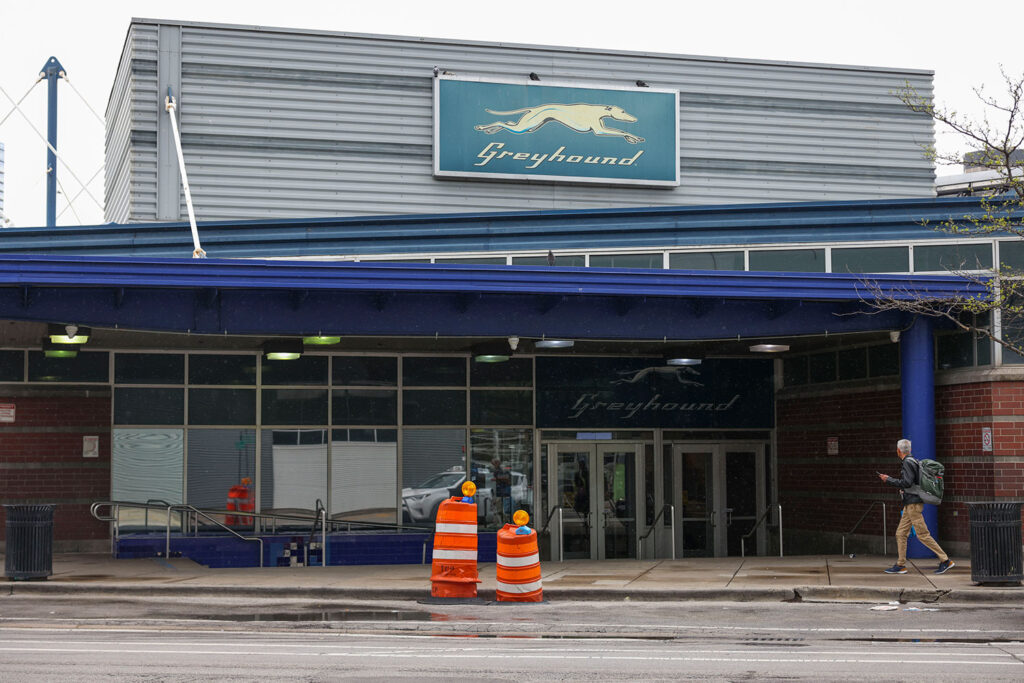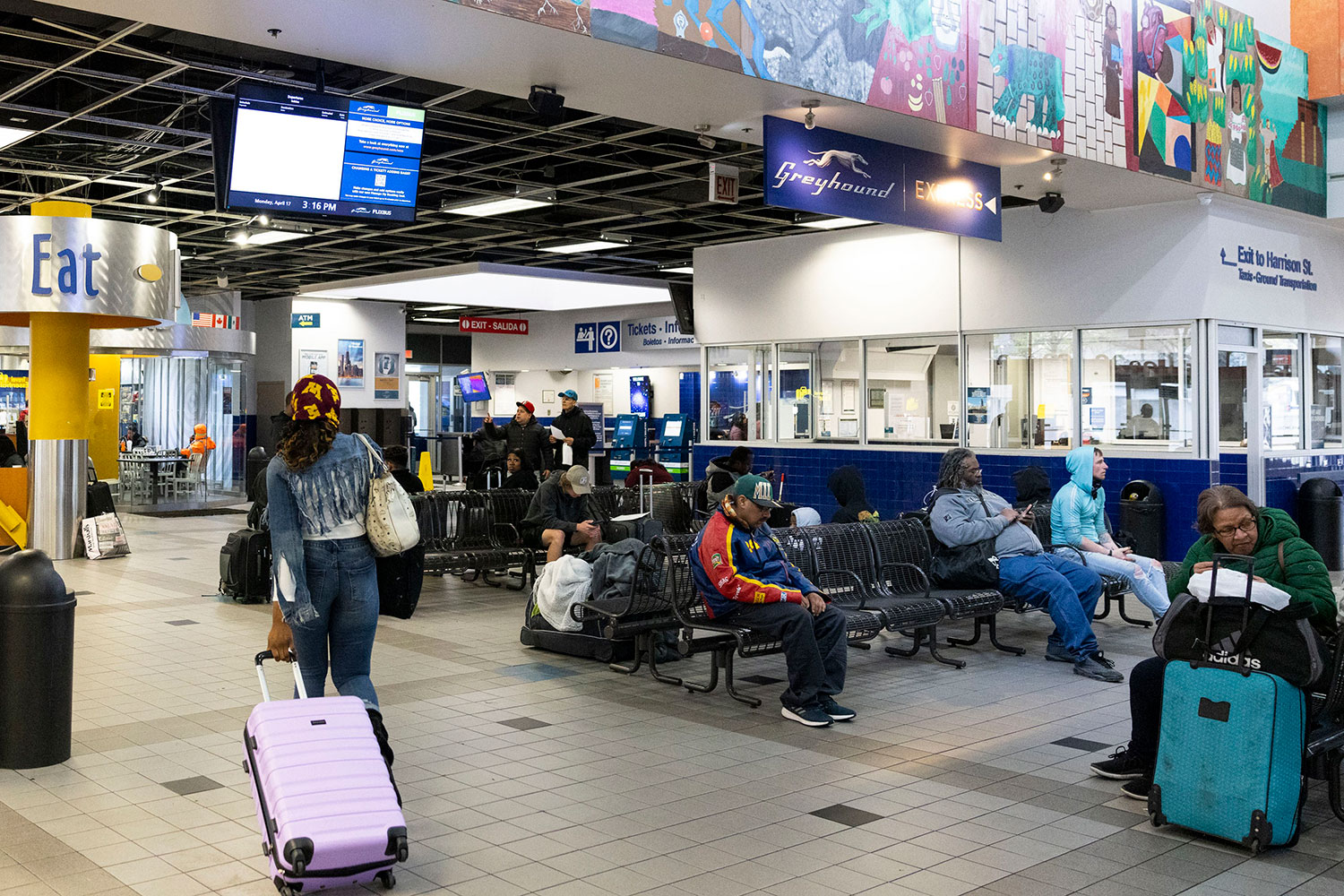Tom “Munch” Rupert sat all alone in the Greyhound bus station on Harrison Street, with most of his worldly possessions crammed into a traveling bag sitting beside him on a wire bench. Bearded, with scraggly white hair and a mouth underpopulated with teeth, Rupert was traveling from Denver, where he lives “on Social Security and disability,” to DeKalb, where he was born, “to get my birth certificate and other documents.” Rupert had taken a train from Denver to Ottumwa, Iowa, then a bus to Champaign and Chicago.
“It’s more affordable than flying,” he said, “and I trust wheels more than wings. The bus was actually pretty reasonable. It was Trailways.”
His bus from Champaign left at 2:54 in the morning, so “I ended up having to sleep outside. That bus station, they close it at midnight.” His bus to DeKalb wouldn’t depart until 6:45 the next morning, so he planned to sleep in the bus station, on the wire benches: “I’m just gonna stretch out and cover up with my blanket and go to sleep. That’s the thing about this place. They don’t seem to bother people like a lot of bus stations.” Where he’d go after DeKalb, he didn’t know.
“I might go on to Pennsylvania,” he said. “Or back to Ottumwa, to sightsee. It kind of reminded me of Decatur, a big small town. I lived in Decatur for a while.”
The Greyhound bus station is a short-term shelter for travelers on their way from one town to another or even, like Rupert, from one life to another. There’s not much to do there. The short order grill is long closed, blocked off by a grate. A few vending machines dispense pop, snacks, and Travel Essentials: masks, headphones, Pepto Bismol, Dramamine. Most of the ceiling tiles have fallen out or been removed. It looks like the kind of place a guy named Sport would cruise for teenage runaways on an episode of CSI. But it’s open 24 hours; it’s cool in the summer, warm in the winter, and restrooms are available. Unfortunately, the station is scheduled to close next month when its lease expires. When Greyhound’s current corporate parent, FlixBus, acquired the company in 2021, it did not acquire the bus stations. Most were sold to Twenty Lake Holdings, a Connecticut investment company that wants to build a high rise apartment tower on the property. Passengers who “ride the dog” will, literally, be kicked to the curb, because the city so far has no plans to open a new station.
“I’d be on the street,” Rupert said, “along with probably every other person in here who would have to find someplace other than an air-conditioned bus station.”

Last year, DePaul University’s Chaddick Institute for Metropolitan Development issued a study, “Bus Station on the Brink,” urging the city to buy the station, at a cost of $30 million. Chicago likes to consider itself the transportation hub of the universe, with millions of passengers changing planes, trains, and buses here every year. But are bus riders even worth sheltering? They don’t bring much to Chicago. Here are some of the study’s findings:
- The Greyhound bus station “handles 55 buses daily, serving around 500,000 annual passengers, more than commercial airports in Bloomington, Champaign-Urbana & Rockford.”
- “Chicago’s intercity bus system serves customers with substantially lower incomes, less access to cars, and higher unemployment than the general population. Surveys by state governments in the Midwest show that roughly three-quarters of riders have household incomes of less than $40,000. More than a quarter would not have made the trip if bus service were not available.”
- “If the Chicago Greyhound Terminal closes and operations are shifted to a curbside spot, as has happened in Charlottesville, VA, Portland, OR, and Tampa, FL, and several other cities, metropolitan Chicago would be the only urbanized region with more than 2.5 million people in which passengers are forced to wait outside with average winter temperatures below 40 degrees. Chicago’s average January temperature is just 22 degrees, creating an untenable situation.”
So unless the city buys the Greyhound station, or immediately opens another, this winter we’re going to have a lot of poor folks waiting in the cold for buses, like figures in a black-and-white photo from the Depression. Buses are often the only way to reach tertiary cities not associated with glamorous travel. Robert Martin was waiting to catch a bus to Benton Harbor, Michigan, after taking a train from Tupelo, Mississippi, to Chicago.
“I just got here on the train,” he said. “I thought I’d wait here instead of Union Station. I’m glad I won’t be here in September. Hopefully, they’ll come up with something.”
Vishad Anand was changing buses between Indianapolis and Michigan City. Since there’s no place to eat, he ordered Taco Bell from Door Dash, which probably wouldn’t have been an option if he’d been standing on a curb.
Sandra Slaughter was sitting on the steps outside the station, waiting for a bus back to Lansing, Michigan, after visiting her son here. She was, she said, finished with riding buses.
“There’s too many people around here screaming and yelling,” she said. “I’m gonna take the train next time.”
That’s the Blue Water, which arrives and departs from Union Station every day. At least she’ll have a place to wait for it.



